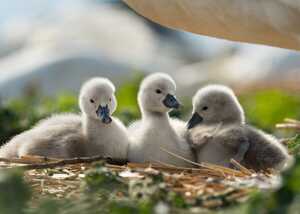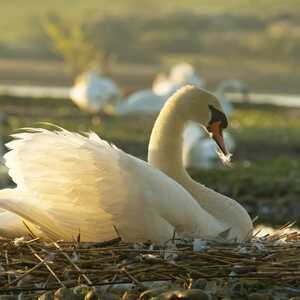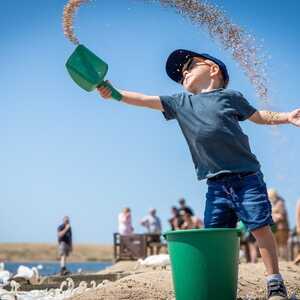A unique wildlife haven on Dorset’s Jurassic Coast
Abbotsbury Swannery is home to the only managed colony of nesting Mute Swans in the world. Found at the western end of the Fleet Lagoon, the historic site plays a vital role in local biodiversity, habitat management and wildlife research – making it one of the most important animal attractions in the UK.
From swan ringing to reedbed care and year-round observation, the Swannery team works closely with nature, helping to protect both the resident swans and the wider ecosystem of this Dorset nature reserve.

Monitoring swans throughout their life cycle
Swan ringing helps build long-term understanding
Every year, over 100 pairs of Mute Swans nest at Abbotsbury. Once the cygnets reach the right age, the team begins the process of carefully applying rings to their legs. The rings act as identifiers that provide a detailed record of each swan’s life.
Swanherds and staff can track individuals as they return in future seasons, monitor their health, and observe changes in nesting behaviour. It’s a practice that supports long-term conservation and helps protect the species from emerging threats.
Ringing also distinguishes Abbotsbury’s swans from others. A white ring identifies birds hatched on site, while yellow indicates those born elsewhere. The system links into national swan data, helping to build a bigger picture across the UK.

Caring for reedbeds and preserving vital habitat
Reeds support wildlife, nesting and thatching traditions
The reedbeds at the edge of the Fleet Lagoon are essential to both the swans and the wider environment. They provide nesting material, shelter for smaller birds, and breeding space for insects and amphibians.
Reeds are managed carefully throughout the year. Some are harvested for thatching local buildings – a traditional craft that continues to this day – while others are left untouched to support biodiversity. The balance is monitored by the Swannery team to ensure the habitat remains healthy and productive.
The presence of fresh water in this part of the lagoon, along with the reedbeds and open space, is one of the reasons so many swans choose to nest here in such high numbers.
Seasonal care, observation and protection
The team works year-round to support the colony
Each season brings its own responsibilities. In spring, the team supports the nesting process and watches for early signs of illness or disturbance. By summer, moulting begins – a period when swans lose their flight feathers and become temporarily grounded. Regular feeding, health checks and space management are especially important during this time.
In autumn, as the cygnets grow and prepare for independence, they receive their adult rings. Winter brings harsher conditions, and the swans move into more sheltered parts of the lagoon. The team continues to provide food and monitor the health of the colony throughout.
All of this work is done quietly and carefully to limit stress on the birds, while ensuring visitors can enjoy the sight of swans in their natural setting.

Supporting a wider conservation landscape
The Swannery is part of a broader ecosystem
The Swannery’s position on the Chesil and Fleet Nature Reserve places it within one of the most ecologically significant areas on the South Coast. The Fleet Lagoon stretches for 8 miles and supports eelgrass beds, wildfowl, and migratory birds, many of which rely on the same resources as the swans.
By managing its corner of the reserve with precision and respect, Abbotsbury Swannery contributes to the overall health of this rare coastal habitat. It is a living example of how tourism, tradition and conservation can work together to preserve nature.
A rare and meaningful visitor experience
Learn and connect in a working conservation site
Daily feeding sessions, live commentary, and seasonal trails help guests understand the life and challenges faced by the swan colony.
The connection between people and wildlife is what makes Abbotsbury stand out among wildlife attractions in Dorset. It’s a place to observe, learn and enjoy – while knowing that every visit supports work that matters.
For those looking to experience something truly unique and important to the region’s ecology, the Swannery remains one of the most rewarding things to do in Dorset.
Posted on October 8th 2025
